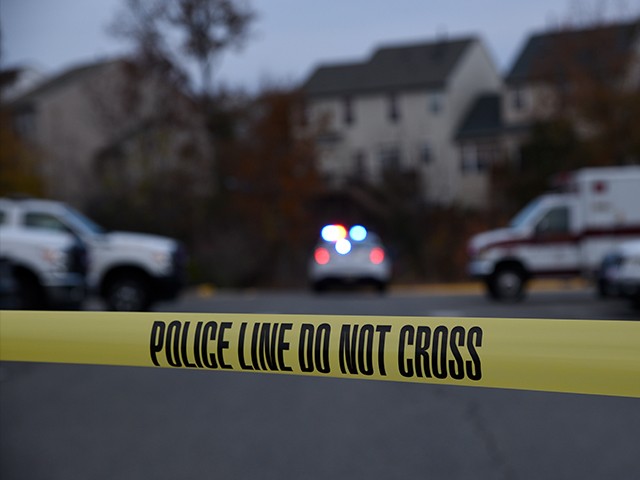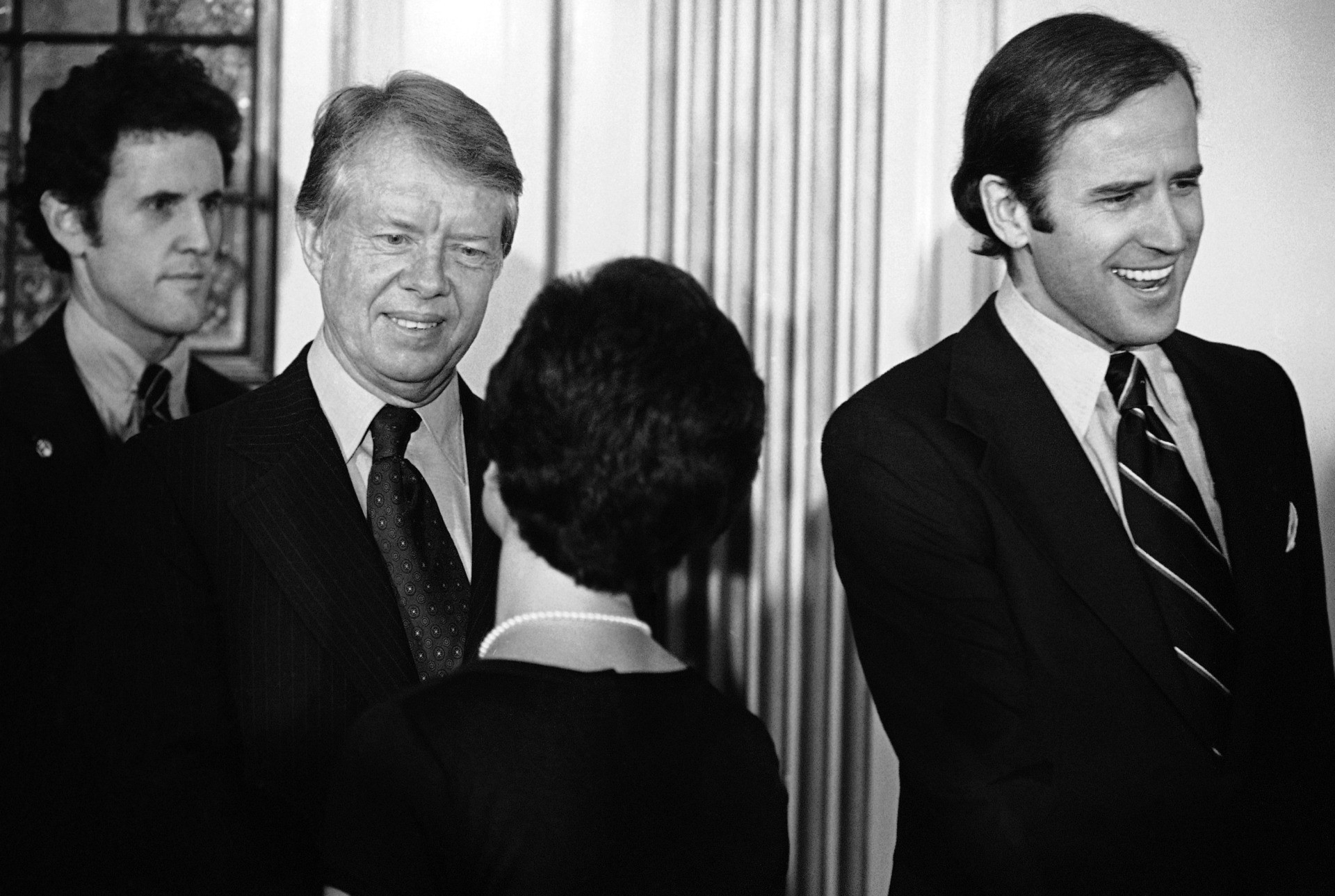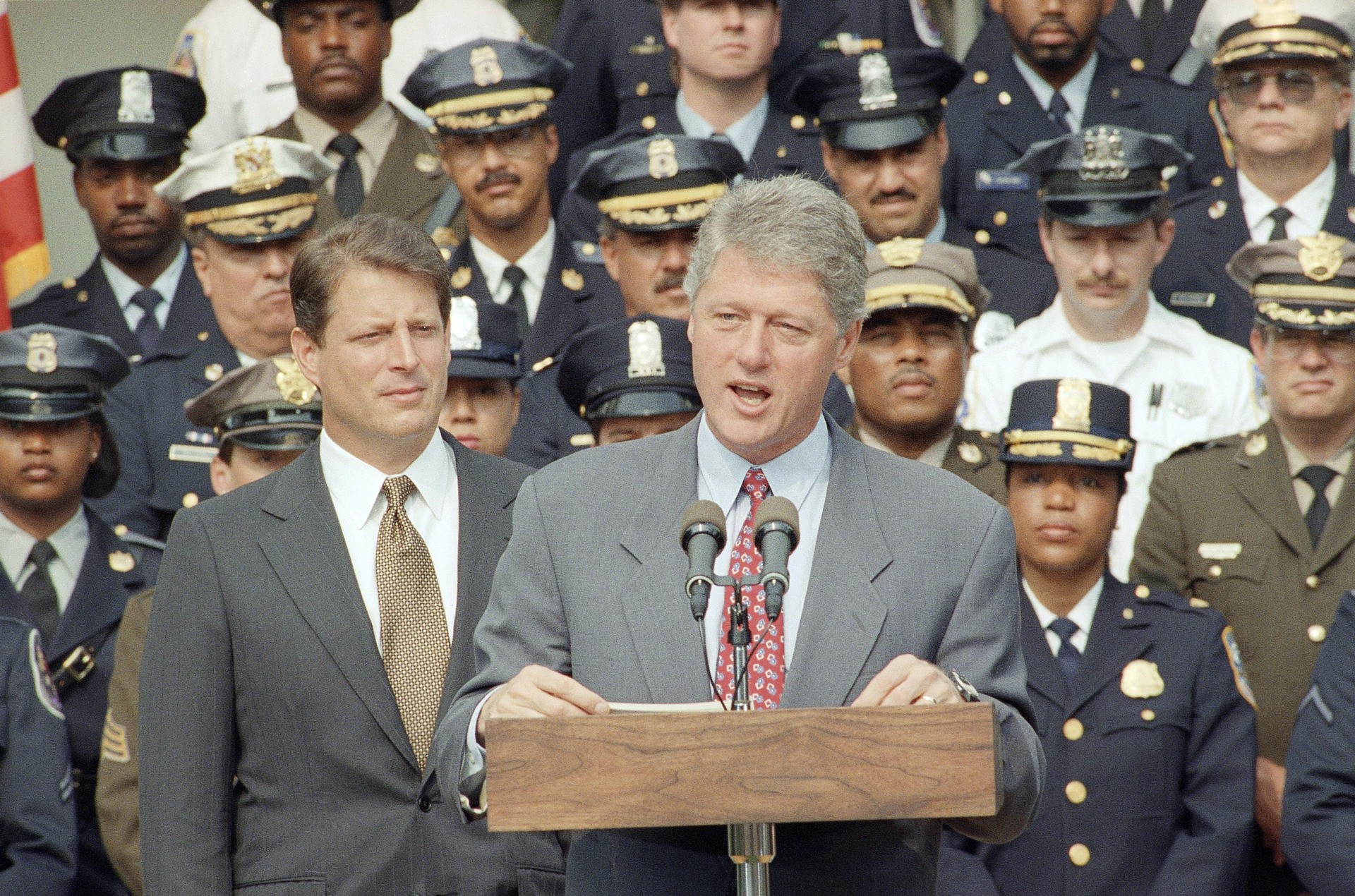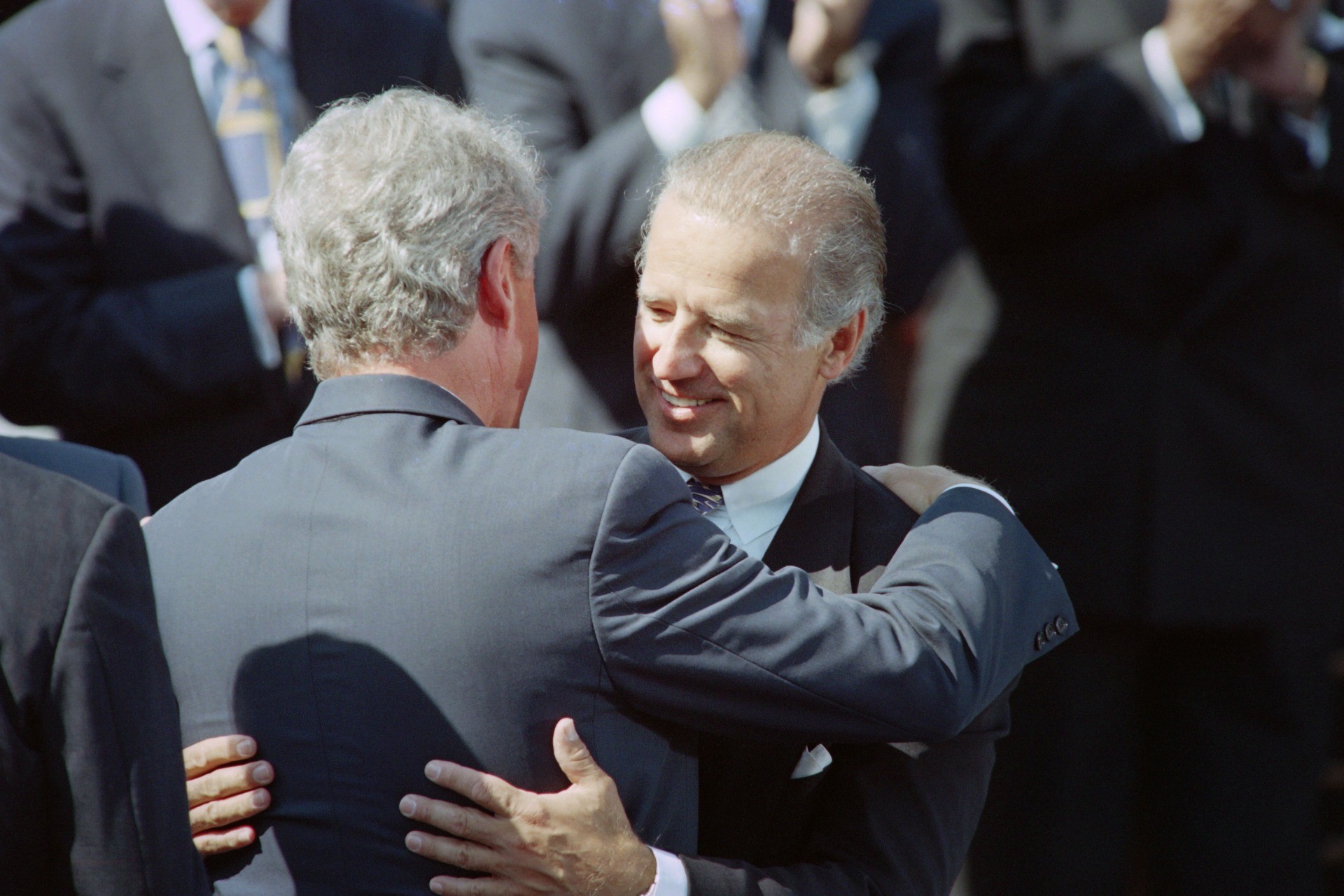Pinkerton: Hey, Joe Biden – the 1970s Are Calling Again. This Time It’s About Crime.
Mean Streets
Here at Breitbart News, we’ve noted some of the similarities between the 46th president, Joe Biden, and the 39th president, Jimmy Carter—on energy and the environment, on inflation, and on foreign policy. And now, we can turn to yet another area where Biden and Carter are starting to resemble each other: crime.
Here are some recent headlines to set the stage:
Breitbart News, May 16: “Nearly 30 People Shot Friday into Saturday Night in Chicago.”
The New York Times, May 7: “‘Covid Crime Wave Weighed Heavily on Atlanta Mayor,” referring to Keisha Lance Bottoms, who announced her “retirement” earlier this month, having seen her popularity—and re-electability—undermined by horrendous crime statistics, per the Times: “In the first 18 weeks of the year, police statistics show homicides up 57 percent, rapes up 55 percent, aggravated assaults up 36 percent and auto thefts up 31 percent compared with the same period last year.” Of course, we might quibble with the exact wording of the Times’ headline: It’s far from clear that Covid had anything to do with the surge in crime, which started rising in 2014. And yet Bottoms, a Democrat, has to blame someone other than herself, and the Times is happy to play along.
Axios, May 1: “It’s set to be a hot, violent summer,” tells us, “A sample of 37 cities with data available for the first three months of 2021 collected by the crime analyst Jeff Asher indicates murders are up 18% over the same period in 2020. The continued increase comes after a year in which major U.S. cities experienced a 33% rise in homicides.”
We could go on and on with grim statistics, and yet sometimes, individual sad stories tell us more; for instance, here’s the Dallas Morning News on May 16: “Police identify 18-year-old man arrested in connection with 4-year-old’s Mountain Creek slaying.” The case concerns the murder of a toddler in a Dallas neighborhood, allegedly kidnapped and killed by a man who was—you guessed it—living at home while awaiting judicial action for an earlier case. Yes, the all-too-familiar revolving door: arrested, turned loose, another crime.

(Getty Images)
Okay, so where does Biden fit in? He is, after all, the president, not a mayor. And to his credit, he’s said that he doesn’t want to defund the police. However, Biden is the commander-in-chief, and so the buck stops with him.
And yet he’s not the only voice in his administration; as we know, actual policy is set by myriad voices at the cabinet and sub-cabinet level. And in this administration, many are woke.
One obvious wokester is Biden’s pick to be the Assistant Attorney General for Civil Rights, Kristen Clarke. She’s a Black Lives Matter activist who has called for de-funding the police and has a tendency to over-tweet—and seemingly, on top of all that, is a crackpot.
Yet in terms of what an assistant attorney general can do to affect crime on the streets, the issue is not just federal legislation; there’s also the little-understood variable in policing: the consent decree. Consent decrees are agreements concerning police procedures, typically worked out between plaintiffs’ lawyers (such as, for example, attorneys for the American Civil Liberties Union) and defendants’ attorneys (typically a city’s legal staff), and brokered by a judge. It’s a murky process, and a liberal process, too; oftentimes, the lawyers and judges are all working in cahoots with each other, aiming to achieve an agreed-upon liberal goal.
And the effect of these consent decrees can be profound; the Manhattan Institute’s Heather MacDonald cites some recent history:
During the Obama years, career attorneys in the Justice Department regularly taxpayer-funded fees while they held police departments to draconian deadlines and mindless paper-pushing mandates for years.
From the legal-left’s point of view, consent decrees are a beautiful thing, because the process of transforming police departments can occur outside of the political system, and away from direct accountability to the voters. That is, the lawyers and judges can establish a new policy that has the effect of law, without any official political input. And then, mayors and other elected officials—mostly Democrats, of course—can say, “Don’t blame me, it’s a court order, my hands are tied.”
Thus with hidden-hand consent decrees the left gets what it wants, and Democratic pols get they want, which is the avoidance of blame. (We might add that consent decrees have been used to win liberal goals far beyond police “reform”; including on homelessness, prisons, mental health, and schools.)
This practice of the Justice Department pushing consent decrees was curbed under the Trump administration, and yet now, under Biden, consent decrees are likely to make a comeback. Such interfering with the police is, after all, what liberal Democrats like to do.
And so what will this mean on the streets? We can get a glimpse of the likely future from the recent past; here’s a revealing headline from Axios earlier this month: “Crime jumps after court-ordered policing changes.” (“Court-ordered” is a synonym for consent decree.) As the article details, “Most police agencies in recent federally court-ordered reform agreements saw violent crime rates skyrocket immediately, according to an Axios examination of departments under consent decrees since 2012.”
So now, will we see more such court-ordered consent decrees under Biden? And more crime? What’s your guess?
We’ve Been Down This Road Before
The truth is, crime can be controlled. Over the long history of the United States, the crime rate has gone up and down; the biggest single variable is the effectiveness of the police. It just takes the political will to empower the policing.
However, politicians don’t always have the will. And to illustrate what happens with lack of will, we might recall the last period, starting in the mid 1960s, when crime exploded.
Joe Biden, born in 1942, should remember that era well. During the decade from 1965 to 1975, as Biden went from being a new college graduate to a freshman U.S. senator, the violent crime rate rose 268 percent; the number of murders, for instance, jumped from 9,960 to 20, 510.
That crime wave greatly affected U.S. politics. As early as 1968, Republican Richard Nixon won the White House on a pledge of “law and order.” Indeed, in those days, Biden himself posed as a tough Democrat; in his first senate campaign in 1972, he was notably pro law-and-order.
Yet the forces pushing crime upward—liberal de-policing, lenient judges, and a pro-criminal counter-culture—were stronger than any politician or party.
Indeed, it was not until the late 1970s that the country finally said, “Enough!” And that was bad news for the Democratic president in the White House, a fellow named Jimmy Carter.
Carter, elected in 1976, was supposed to be different and more conservative than the Democrats who had presided over the crime-spike. Perhaps that’s why, in the Democratic primaries that year, Biden was an early and enthusiastic Carter supporter.

President Jimmy Carter and Sen. Joseph R. Biden Jr., greet Biden supporters at a $1,000-a-couple fund raising reception at Wilmington, Del., on Monday, Feb. 20, 1978. Biden was the first U.S. senator to endorse Carters presidential candidacy in 1976. (AP Photo).
Yet in office, Carter proved to be helpless. He himself was personally law-abiding, even virtuous, and yet he could not pull the Democratic Party toward a meaningful anti-crime position. And it showed: In 1977, his first year in the White House, America suffered 19,120 murders; four years later, there were 23, 040 murders—an increase of more than 20 percent. Similarly, the overall violent crime rate rose more than 30 percent.
In other words, Carter was no more successful at stemming crime than he was at reducing energy prices, or stopping inflation, or dealing with Iran.
In the meantime, Republicans sensed their opportunity. The 1980 Republican Platform was notably hawkish on crime:
We support a vigorous and effective effort on the part of law enforcement agencies. . . . Just as vital to efforts to stem crime is the fair but firm and speedy application of criminal penalties. The existence and application of strong penalties are effective disincentives to criminal actions. Yet these disincentives will only be as strong as our court system’s willingness to use them.
For good measure, the platform enthusiastically embraced the death penalty.
That November, Carter lost to Republican Ronald Reagan in a landslide. And thanks to hard-nosed Reagan appointees such as Attorney General Ed Meese, the crime surge did slow in the 1980s, and then started to actually fall in the 1990s, as better policing techniques took hold. Indeed, one of the anti-crime warriors in the 90s was none other than Joe Biden; in 1994, his strong anti-crime bill received widespread bipartisan support, and was signed into law by Democrat Bill Clinton.

President Bill Clinton, accompanied by Vice President Gore and police officers from around the country, unveils his anti-crime package in the Rose Garden of the White House on August 11, 1993. (AP Photo/Barry Thumma)

President Bill Clinton (L) hugs Sen. Joseph Biden, (D-Del), on September 13, 1994, during a signing ceremony for the crime bill on the South Lawn of the White House. President Clinton said the crime bill would “roll back this awfull tide of violence” in the U.S. (Paul J. RICHARDS/AFP via Getty Images)
So we can see: When the streets are mean, the parties can work together to clean them up—if, that is, they want to.
Yet a funny thing happened to Biden on his way to the 2020 Democratic nomination. Mindful of the rising progressive spirit within his party, Biden, always flexible, shape-shifted his way to an actual apology for engineering that 1994 crime bill.
This new liberal tone—defund the police, and all that—has infected the nation, demoralizing cops and inspiring crooks. And so crime is back, big time. As they say, ideas have consequences—and so bad ideas have bad consequences.
So here’s a revealing headline from the Washington Post on May 15: “With violent crime spiking, the push for police reform collides with voters’ fears.”
In other words, liberal fantasies about policing—basically, fewer police, doing less—are hitting the brick wall of crime. To most Americans, it’s easy to have some sympathy for “criminal justice reform,” until, that is, they meet actual criminals; then, their enthusiasm tends to dwindle.
Even amidst the politically correct framing of the Post, the reality of crime-fear comes biting through:
It has been less than a year since George Floyd was murdered by a police officer in Minneapolis, spawning a national movement to reimagine the American criminal justice system and end race-based abuses. Yet with shootings spiking in cities nationwide . . . there are growing signs that the thirst for change is being blunted by fears of runaway crime. [emphasis added]
In other words, defunding the police is a lot less popular, now, than up-funding the police. And as the article further notes, progressive prosecutors—some of them funded by George Soros—are now on the defensive.
Indeed, even New York City, where Donald Trump won just 11 percent of the vote last year, is turning hawkish. The front-runner in the Democratic primary for mayor is Eric Adams, a Black man and a 22-year veteran of the NYPD, who says, “Violent crime is the number one issue. People want to be safe.”
Okay, so that’s a local election, far from the Biden White House. And yet voter discontent is loud enough to already be setting off tremors, such that even the MSM is noticing. Hence this May 18 headline in the London-based Financial Times: “America’s urban crime wave threatens Biden.” In the words of reporter Edward Luce, “Liberals will take most of the blame if such trends persist. Biden would be unlikely to escape the backlash.” And on May 21, an arch wokester, Ezra Klein, founder of the ultra-left Vox, now at The New York Times, tweeted out a long thread that began:
Violent crime is spiking. Homicides in cities were up by 25-40 percent in 2020, the largest single-year increase since 1960. And 2021 isn’t looking any better. This is a crisis on its own terms. But it’s also a crisis for the broader liberal project in two downstream ways.
Violent crime is spiking. Homicides in cities were up by 25-40 percent in 2020, the largest single-year increase since 1960. And 2021 isn’t looking any better.
This is a crisis on its own terms. But it’s also a crisis for the broader liberal project in two downstream ways.
— Ezra Klein (@ezraklein) May 21, 2021
And then Klein proceeded to outline the ways that liberalism on crime hurt both people of color and the Democratic Party. So we can see: Not even a year after the death of George Floyd, the woke left is in full retreat.
Next, on May 24, the New York Times offered this headline: “A Year After George Floyd: Pressure to Add Police Amid Rising Crime.” As the story explained:
A year after streets echoed with calls to “defund” law enforcement and city leaders embraced the message by agreeing to take $150 million away from the Los Angeles Police Department, or about 8 percent of the department’s budget, the city last week agreed to increase the police budget to allow the department to hire about 250 officers. The increase essentially restores the cuts that followed the protests.
In other words, the whole “defund the police” movement was a blip. Indeed, as Breitbart News has reported, support for Black lives Matter is now back down to where it was in 2019.
These headlines and data points are warnings to the Democrats, the party in power: Heed them, or you’ll lose your power. And without a doubt, the old Joe Biden would have been heeded these warnings, and been ready to go full hawk, just as he did with that tough 1994 crime bill.
But that was 27 years ago. Does the new Biden—actually, the much older Biden—have the same sensitive finger on the voters’ pulse? Is he awake enough to override the wokesters in his administration?
As of now, those are unknown unknowns. All we do know is the fate of Jimmy Carter, that proto-Joe Biden.





Comments are closed.